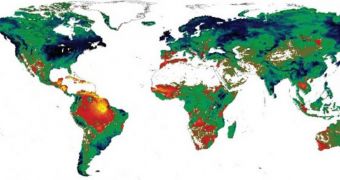Figuring out how climate change will influence the world's food supplies, health levels, vegetation cover and freshwater supplies is an essential aspect of preparing for what's to come. University of Cambridge scientists are now part of an effort to simulate these complex issues.
Their latest community-driven modeling effort seeks to shed more light on the complex effects that changing climate patterns will have on some of humanity's most basic needs. The goal of their investigation is to simulate scenarios in which Earth is 2 to 4°C warmer than it is now.
Arguably, creating a model of what causes global warming, and how the latter will change our planet's environments and habitats, is one of the most complex tasks scientists have ever been faced with. The sheer number of factors involved in understanding this system is overwhelming.
However, this complexity needs to be overcome, if scientists are to present viable data destined to inform politicians and other decision-makers in creating the policies needed to avoid a bleak scenario.
An international group of scientists began the first collective effort meant to produce a systematic quantification of some of the uncertainties related to global warming earlier this year. This endeavor is called the Inter-Sectoral Impact Model Intercomparison Project (ISI-MIP).
Led by investigators at the Potsdam Institute for Climate Impact Research, in Germany, and the International Institute for Applied Systems Analysis, in Austria, ISI-MIP involves 24 research groups from 8 countries working together towards a common goal.
“To make policy you need to understand the impact of decisions. There hasn’t been a coordinated impacts project for IPCC [UN Intergovernmental Panel on Climate Change] across sectors before, and now this is covering four key sectors across four climate change scenarios from multiple climate models,” Dr. Andrew Friend says.
“The idea is to understand at what point the increase in global temperature starts to have serious effects across all the sectors, so that policy makers can weigh up the probable impacts of allowing emissions to go above a certain level, and what mitigation strategies are necessary to avoid significant risk of dangerous climate change,” he adds.
The expert holds an appointment as the coordinator of one of the simulations being conducted as part of ISI-MIP, and is based at the Cambridge University Department of Geography.
By January 2013, all research teams in the study will have their models ready, and will cross-reference them in order to detect the most visible differences. This will provide them with new data on the evolution of climate change on Earth.

 14 DAY TRIAL //
14 DAY TRIAL //